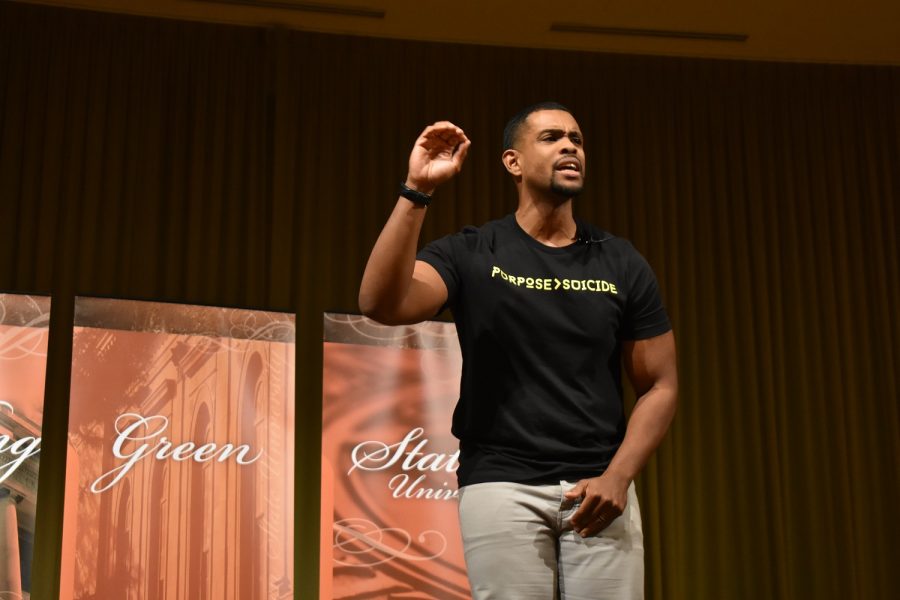“The reality is we all have a mental health the same way we all have a physical health and we have to be sure we are taking care of it.” — Richard Taylor Jr.
According to the National Institute of Mental Health in 2017, 10.6 million adults aged 18 or older reported having serious thoughts about suicide, and 1.4 million adults made a non-fatal suicide attempt during the past year. Among those adults who attempted suicide, 1.2 million reported making suicide plans.
Tuesday night, BGSU invited Richard Taylor Jr. to speak in the nearly full Bowen-Thompson Student Union ballroom. Students and community members had gathered to hear him share how he personally overcame depression and a suicide attempt and his hope for communities where mental health is a priority.
“You here at Bowling Green have an opportunity to create a blueprint for other universities to follow,” Taylor told students.
As the tall, young, athletic black man took the stage, the students and community members of the audience silenced to hear his words. There was very little shuffling in seats, and almost no one left once Taylor began to speak. His story appeared to resonate with those listening.
He began his battle with depression and self-esteem issues as a child, when he was bullied for being fat. Even though he lost that weight, the scars stayed with him and he never was able to express the pain he felt.
“For me it was difficult because there isn’t a lot of help out there for people like me, also there was a lot of the ‘what happens in this house, stays in this house’ type of conversations going on. There were family issues stemming from my relationship with my dad and what kind of man — son he wanted me to be. That kind of kept me from getting help as early as I might have,” Taylor said.
Taylor said he felt that he may have recovered earlier in his journey if he had gotten help at a younger age, and that has helped fuel his passion for what he does. He went on to explain how mental health is something requiring as much attention as physical health.
It is isn’t anything to be neglected or to be ashamed of. He believes it will become easier to address in the future as Millennials and Gen Z begin to bring it out of the closet.
“It’s not like it hasn’t existed. It’s more that we’re talking about it, right? Then talking becomes mobilization and then we begin to move past the stigma. I’m trying to create systems where we can have these conversations,” Taylor said.
He admitted toxic relationships are at the center of mental health issues. For him, resolving the situation around toxic relationships is multifaceted.
“A big part of healing from past trauma is forgiveness. Forgiveness is hard, but not doing it is like drinking poison and waiting for the other person to die,” Taylor said. “It’s not so much for the other person as it is for yourself. Unforgiveness is toxic to your own person.”
The students responded to Taylor with questions and hugs. He stepped down to meet with them during the question and answer period and was greeted with tears, hugs and smiles. The BGSU Counseling Center had staff on hand to provide support as well.
Dominic Orozco, sophomore middle child education major, asked a question about Taylor’s definition of a strong person.
“I really liked that he defined a strong person as someone who is enthusiastic, self-disciplined and also vulnerable. Not just the typical person you imagine,” he said.
Other students were a little less enthusiastic about how often he mentioned his books.
“I liked what he had to say, but I felt like it was overshadowed a bit by him pushing his books. Don’t be so pushy with your book quotes,” said Lauren Siffert, sophomore microbiology major.
Seth Crosby, junior business management major, felt that his message is really timely with all the things going on right now.
“I feel like he was a powerful speaker. His message was something a lot of people needed to hear right now with the things people are facing right now. I’m glad he came to our campus,” he said.
Taylor said he believes mental health awareness is growing. He encourages each person to look to their own mental health and to work to build the mental health of those around them.
More resources can be found on Taylor’s social media at https://www.unashamednation.com/ or at the BGSU Counseling Center at https://www.bgsu.edu/counseling-center.html.














